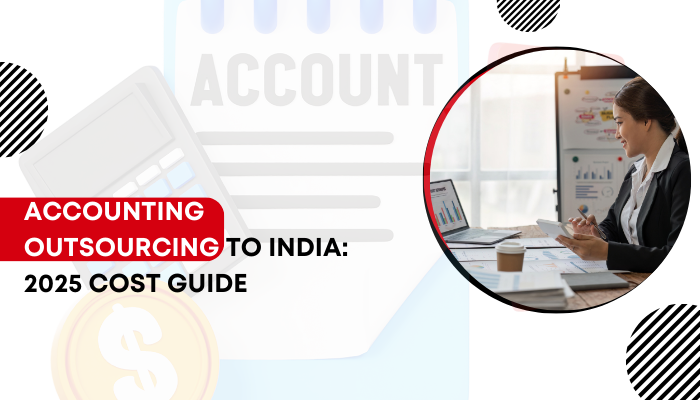Managing books, taxes, and compliance is one of those behind-the-scenes jobs that can either keep a business running smoothly—or turn into a nightmare if not handled properly. That’s where accounting outsourcing comes in. More and more businesses in the U.S. and Europe are realizing that outsourcing their accounting processes not only saves money but also improves accuracy and efficiency.
India has quickly become the top destination for this service. From startups trying to stretch every dollar to large enterprises aiming for scalability, accounting outsourcing to India is no longer a trend; it’s becoming the norm in 2025.
But here’s the big question: What does it actually cost, and is it worth it? Let’s dive deep into the numbers, benefits, and real-world insights to give you a clear picture.
Why India Leads the World in Accounting Outsourcing
It’s no secret-India has been a hub for IT and back-office services for decades. But why has it become the global hotspot for accounting outsourcing specifically?
-
Talent Pool: Over 2 million finance and accounting professionals graduate every year in India (Fictional Source: Global Accounting Skills Report, 2024).
-
Cost Advantage: Outsourcing to India can save companies up to 60–70% on accounting expenses compared to hiring in-house staff.
-
Time Zone Benefits: Indian teams work while U.S. and European companies sleep, ensuring 24/7 productivity.
-
Technology Integration: From QuickBooks to Xero, Indian accountants are trained and certified in the latest tools.
I remember talking to a U.S.-based founder last year who admitted, “I was nervous about trusting a remote accountant with my books. But within two months, my outsourced team in India had my financials cleaner than they’d been in years.” That’s the kind of reassurance many entrepreneurs are now experiencing.
Breaking Down the Costs of Accounting Outsourcing to India in 2025
When people think of outsourcing, the first thing that comes to mind is “cheap.” But it’s not just about affordability-it’s about value. Here’s a cost breakdown for 2025:
1. Bookkeeping Services
-
Cost in the U.S.: $40–$60/hour
-
Cost in India: $10–$20/hour
2. Tax Preparation & Compliance
-
Cost in the U.S.: $200–$400 per filing
-
Cost in India: $50–$100 per filing
3. Payroll Management
-
Cost in the U.S.: $250–$500/month for small businesses
-
Cost in India: $80–$150/month
4. Full-Time Offshore Accountant
-
Salary in the U.S.: $60,000–$80,000/year
-
Salary in India: $12,000–$18,000/year
This isn’t just a numbers game-it’s an opportunity for businesses to reallocate saved money into growth, marketing, or product development.
Top Benefits Beyond Cost Savings
Let’s face it-saving money is great, but it’s not the only reason businesses turn to accounting outsourcing.
1. Focus on Core Business
Instead of getting buried in invoices and spreadsheets, leaders can focus on scaling operations.
2. Scalability
Need one accountant today and a team of five tomorrow? Outsourcing makes it seamless without recruitment headaches.
3. Access to Expertise
Indian outsourcing firms often have specialists in U.S. GAAP, IFRS, and local tax compliance, offering global knowledge at local prices.
4. Reduced Risk of Errors
Automation tools paired with expert oversight reduce mistakes that could cost thousands in penalties.
When I was running a small eCommerce store, I spent nights trying to reconcile transactions. It wasn’t until I explored outsourcing that I realized how much mental energy I was wasting. The relief of finally handing it over to professionals felt like a breath of fresh air.
Hidden Costs and Things to Watch Out For
Of course, outsourcing isn’t without its challenges. Businesses should be mindful of:
-
Communication Gaps: Time zone differences can be tricky without clear schedules.
-
Data Security: Always ensure NDAs and secure systems are in place.
-
Cultural Understanding: Financial practices differ, so alignment is crucial.
-
Vendor Reliability: Not all outsourcing firms are equal—due diligence is key.
Pro tip: Start with a small project before committing to a long-term contract. It’s like dating before marriage—you want to know if the partnership truly works.
How to Choose the Right Accounting Outsourcing Partner in India
Here’s what to keep in mind when selecting a firm or individual:
-
Check Certifications: Look for CPAs, CAs, or equivalent qualifications.
-
Technology Stack: Ensure they use tools you’re comfortable with.
-
Client References: Ask for case studies or testimonials.
-
Scalability Options: The right partner should grow with your business.
-
Trial Periods: Many Indian firms offer free trials or short-term contracts to build trust.
Real-World Scenarios: Who Benefits the Most?
-
Startups: Early-stage companies can’t afford full-time accountants, so outsourcing is a lifeline.
-
SMEs: Growing businesses often face fluctuating accounting needs. Outsourcing fills the gap.
-
Enterprises: Even large firms outsource bulk work like payroll processing to cut costs.
Think about it-would you rather spend $80,000 on one accountant or get an entire team in India for a fraction of the price?
Conclusion
Accounting isn’t just about balancing books; it’s about making smarter decisions, ensuring compliance, and creating financial stability. By 2025, more businesses than ever are leaning on accounting outsourcing as their secret weapon for growth.
And when it comes to choosing a destination, India remains unmatched in expertise, affordability, and scalability. If you’re considering making the shift, it might just be the smartest investment you’ll make this year.
That’s why many companies are now looking toward accounting outsourcing in India to secure a competitive edge without breaking the bank.
Click – interiordesigningtrend.com

